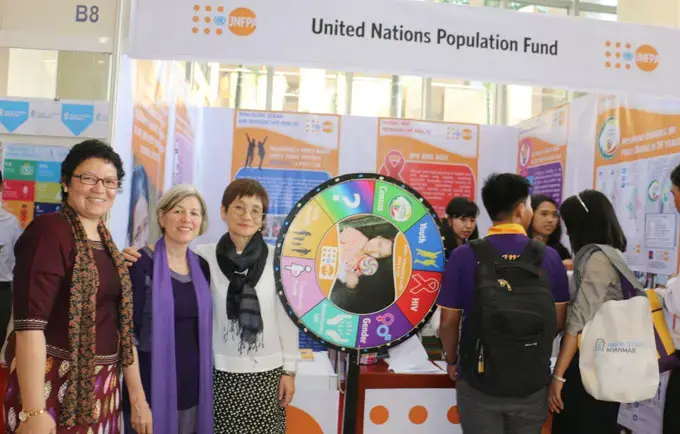YANGON, Myanmar — When devastating floods hit Myanmar earlier this year, Phoo Ngun in Ohn Pin Su village, Ayeyarwady, was 6 months pregnant. She lost everything in the floods. When UNFPA youth volunteers reached her village by boat, she received essential items for female hygiene and protection in a UNFPA Dignity Kit.
When disaster strikes, women do not stop getting pregnant or having babies. Phoo Ngun is one of 80,000 pregnant women who were affected by the 2015 floods, and one of 26 million women and girls of childbearing age around the world who are carrying extraordinary burdens as natural disasters and conflicts leave a trail of turmoil and destruction.
Today’s launch of UNFPA’s flagship publication – State of World Population – is a call to action to meet the needs and ensure the rights of women and girls affected by disaster and conflict. Called “Shelter from the Storm”, the 2015 report calls for atransformative agenda for women and girls in a crisis-prone world.
The report explains how women and girls have specific needs that are often ignored in crisis. Without the usual protection of family and community, they frequently become victims of sexual violence¹, unwanted pregnancy and sexually transmitted diseases, including HIV.
“UNFPA is committed to the full realization of sexual and reproductive health and rights for women and girls under all conditions, crisis or otherwise. But the prevalence of disaster and conflict in Myanmar means that a large share of UNFPA support goes to services in humanitarian settings,” says Janet E. Jackson, UNFPA Representative for Myanmar.
This year’s State of World Population shows ways in which UNFPA provides reproductive health equipment, medicines and services that save mothers from dying in childbirth, reduce transmission of HIV, and support survivors of sexual violence.
UNFPA provides reproductive health services for displaced women and girls
Myanmar has a long history of internal conflict, and it has the highest number of internally displaced people (IDPs) in Southeast Asia. Around 76% of the region’s IDPs are concentrated in Myanmar. The majority live in protracted displacement, unable to return, integrate locally or settle elsewhere. While the peace process in Myanmar has the potential to bring hope, a staggering 645,000 displaced people live in conditions where maternal mortality is prevalent.²
UNFPA works to ensure that women and adolescent girls in camps in Kachin and Rakhine receive regular reproductive health care from qualified doctors and midwives. UNFPA reaches different religious and ethnic communities in both state and non-state controlled areas.
UNFPA protects crisis-affected women and girls from sexual violence and trafficking
During crisis, sexual violence soars. In Myanmar, sexual violence in humanitarian settings has been described as “widespread”, “prevalent”, “a dominant feature”.³ Working through Women and Girls Centres, UNFPA provides survivors of sexual violence with emergency assistance, such as referral to post rape treatment and legal aid, along with counselling and support.
Extreme financial hardship stemming from crisis makes young women vulnerable to trafficking. The United Nations has reported a surge in trafficking of adolescent girls in areas of Myanmar affected by conflict.³ The Women and Girl Centres support survivors of trafficking and also contribute to trafficking prevention.
Transforming humanitarian action from response towards resilience
The 2015 floods are no longer breaking news. But the recovery work does not end when the water recedes and the headlines stop. Humanitarian action must be transformed to tip the balance from response towards resilience. UNFPA has worked with the Myanmar government and other partners for several years to integrate reproductive health into the central rapid response system. Clean delivery equipment for births, treatments for rape victims, contraceptives and other essential services and supplies are on standby when disaster strikes, and key actors are regularly trained on how to deploy this Minimum Initial Service Package. Thanks to these investments into preparedness, the 2015 flood response included a better capacity to deliver reproductive health services to women struggling under immense duress.
“What is needed now is scaled up commitment and action. Women are the fabric that holds families and communities together. Placing the health of women and girls at the core of priorities during crisis is one of the best ways of ensuring the security, holding-together and well-being of families and entire communities”, says Janet E. Jackson, UNFPA Representative for Myanmar.
UNFPA, the United Nations Population Fund, delivers a world where every pregnancy is wanted, every childbirth is safe and every young person’s potential is fulfilled.
For more information or media inquiries please contact:
- in Yangon,
Yenny Gamming; Tel: +95- (0)9 2604 00005; gamming @ unfpa.org
Si Thu Soe Moe; Tel: +95 (0)9 4500 57730; soemoe @ unfpa.org
Available for download:
- Full report: State of World Population 2015: "Shelter from the Storm: A transformative agenda for women and girls in a crisis-prone world"
- Photos: High-resolution photos of UNFPA assisting women and girls during Myanmar emergencies
References
1 Sexual violence is one form of gender-based violence.
2 http://www.internal-displacement.org/assets/library/Media/201505-Global-Overview-2015/20150506-global-overview-2015-en.pdf
3 United Nations Security Council, 2015




